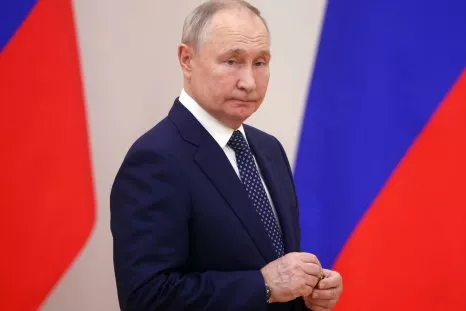India Frets Over America's War Distractions
India has grown concerned that the U.S. is distracted by wars in Europe and the Middle East as the threat from China looms large in the Indo-Pacific.
Indian experts are questioning America's ability to manage conflicts or potential conflicts in multiple theaters, despite Washington insisting Asia remains its top priority.
"The deepening U.S. involvement in the Ukraine and Israel wars is sapping America's diplomatic and military resources. This factor, coupled with questions about an aging Biden's mental acuity, is making Xi more intransigent and willing to take risks," wrote Indian strategic affairs expert Brahma Chellaney on X, formerly Twitter.
On November 10, U.S. Secretary of State Antony Blinken and U.S. Defense Secretary Lloyd Austin traveled to New Delhi, a trip that was widely seen as an attempt by Washington to reiterate support for closer ties with India on the eve of U.S. President Joe Biden's meeting with President Xi Jinping on Wednesday.
In recent years, relations between China and India have nose-dived because of military tensions at their shared border. This has brought New Delhi and Washington closer together.
During Blinken and Austin's India visit—part of the so-called "2+2" diplomatic and security talks—they discussed the Israeli-Palestinian war and the ongoing conflict in Ukraine.
"The ministers discussed developments in the Indo-Pacific, Middle East, Ukraine among other regions. The ministers expressed mutual deep concern over the war in Ukraine and its tragic humanitarian consequences," a joint statement said.
The U.S. and India also "reaffirmed their commitment to further deepen the multifaceted defense partnership through wide-ranging dialogues and military exercises of increasing complexity and sophistication."
Observers believe concerns about an overstretched America remain valid despite the reassurances.
"I think all the allies and partners—including India—are concerned about the United States' capacity to sustain both military support and a high tempo of diplomatic engagement in both of these conflicts. Indo-Pacific states want to see Washington focus more effort on challenges in this region," Ian Hall, an international relations professor at Australia's Griffith University, told Newsweek.
"New Delhi will watch this meeting carefully, but the Indian government would have received a briefing about U.S. expectations for Xi's visit at the recent 2+2 foreign and defense ministers' summit."
Ahead of the Biden-Xi summit, others are watching whether Washington's desire to seek stable ties with Beijing could come at the cost of undermining trust with India and other partners in Asia.
"I don't anticipate that India is apprehensive or has been left out of what Washington's thinking is on how they want to approach the meeting with Xi Jinping," Harsh Pant, a foreign-policy analyst at the Observer Research Foundation think tank in New Delhi, told Newsweek.
Pant said New Delhi also wants to see a more stable U.S.-China relationship. "But the question, of course, is on whose terms this happens."
The intensity of military tensions between China and India will likely keep New Delhi and Washington's geopolitical interests closely aligned.
A new report on the tensions by the International Crisis Group think tank suggests Beijing decided to increase military provocation of New Delhi despite knowing its actions could turn India into a strong U.S. partner.
"According to one Chinese analyst, the bilateral relationship entered 'troubled times' in 2016, when India began to deepen defense cooperation with the U.S.; multiple analysts averred that New Delhi and Washington had become 'quasi-allies,'" the report said.
Chinese experts concluded that India was trying to exploit tensions between the U.S. and China in its interest, and that Beijing was unlikely to go easy on New Delhi as a result.
"India regards China as the biggest source of threats. It takes advantage of the strategic competition between the U.S. and China [...] and takes the opportunity to put pressure on China and increase its ability to check and balance China," Hu Zhiyong, a researcher at the Shanghai Institutes for International Studies, said in a recent op-ed for Singapore's Chinese-language newspaper Lianhe Zaobao.
Disclaimer: The copyright of this article belongs to the original author. Reposting this article is solely for the purpose of information dissemination and does not constitute any investment advice. If there is any infringement, please contact us immediately. We will make corrections or deletions as necessary. Thank you.



